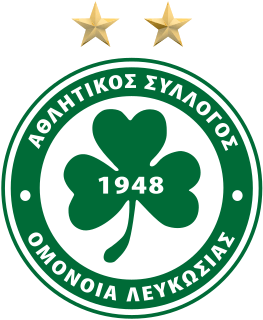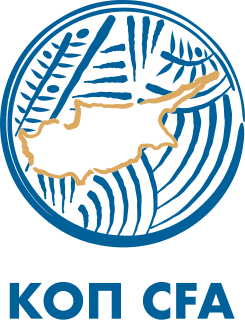The following is a list of ecoregions in Cyprus, according to the Worldwide Fund for Nature (WWF):

Cyprus, officially the Republic of Cyprus, is an island country in the eastern Mediterranean Sea south of the Anatolian Peninsula. It is the third-largest and third-most populous island in the Mediterranean, and is located south of Turkey, west of Syria, northwest of Lebanon, Israel, and the Gaza Strip (Palestine), north of Egypt, and southeast of Greece. Its capital and largest city is Nicosia.

Human habitation of Cyprus dates back to the Paleolithic era. Cyprus's geographic position has caused Cyprus to be influenced by differing Eastern Mediterranean civilisations over the millennia.

Nicosia is the largest city, capital, and seat of government of Cyprus. It is located near the centre of the Mesaoria plain, on the banks of the River Pedieos.

Limassol is a city on the southern coast of Cyprus and capital of the district with the same name. Limassol is the second largest urban area in Cyprus after Nicosia, with an urban population of 183,658 and a metropolitan population of 239,842. In 2014 Limassol was ranked by TripAdvisor as the 3rd up-and-coming destination in the world, in its Top 10 Traveler's Choice Destinations on the Rise list. The city is also ranked 89th worldwide in Mercer's Quality of Living Survey (2017). In the 2020 ranking published by the Globalization and World Cities Research Network, Limassol was classified as a "Gamma −" global city.

Halloumi or haloumi is a semi-hard, unripened cheese made from a mixture of goat's and sheep's milk, and sometimes also cow's milk. Its texture is described as squeaky. It has a high melting point and so can easily be fried or grilled, a property that makes it a popular meat substitute. Rennet is used to curdle the milk in halloumi production, although no acid-producing bacteria are used in its preparation.
The Cyprus problem, also known as the Cyprus dispute, Cyprus issue, Cyprus question or Cyprus conflict, is an ongoing dispute between Greek Cypriots and Turkish Cypriots. Initially, with the occupation of the island by the British Empire from the Ottoman Empire in 1878 and subsequent annexation in 1914, the "Cyprus dispute" was a conflict between the Turkish and Greek islanders.

The Kingdom of Cyprus existed between 1192 and 1489. It was ruled by the French House of Lusignan. It comprised not only the island of Cyprus, but it also had a foothold on the Anatolian mainland: Antalya between 1361 and 1373, and Corycus between 1361 and 1448.

Northern Cyprus, officially the Turkish Republic of Northern Cyprus, is a de facto state that comprises the northeastern portion of the island of Cyprus. Recognised only by Turkey, Northern Cyprus is considered by the international community to be part of the Republic of Cyprus.

The Cyprus national football team represents Cyprus in international football and is controlled by the Cyprus Football Association, the governing body for football in Cyprus. Cyprus' home ground is the GSP Stadium in Nicosia and the current coach is Nikos Kostenoglou.

Athletic Club Omonoia Nicosia is a Cypriot professional football club based in Nicosia. The club was established on 4 June 1948 the club was created because of sighns of communism in the cyprus civil war. The football team of AC Omonia joined the Cyprus Football Association in 1953. On 14 June 2018, the football team of AC Omonoia became a professional for-profit football company.
Turkish Cypriots or Cypriot Turks are mostly ethnic Turks originating from Cyprus. Following the Ottoman conquest of the island in 1571, about 30,000 Turkish settlers were given land once they arrived in Cyprus. Additionally, many of the island's local Christians converted to Islam during the early years of Ottoman rule. Nonetheless, the influx of mainly Muslim settlers to Cyprus continued intermittently until the end of the Ottoman period. Today, while Northern Cyprus is home to a significant part of the Turkish Cypriot population, the majority of Turkish Cypriots live abroad, forming the Turkish Cypriot diaspora. This diaspora came into existence after the Ottoman Empire transferred the control of the island to the British Empire, as many Turkish Cypriots emigrated primarily to Turkey and the United Kingdom for political and economic reasons.

The Sovereign Base Areas of Akrotiri and Dhekelia (SBA) is a British Overseas Territory on the island of Cyprus. The areas, which include British military bases and installations, as well as other land, were retained by the British under the 1960 treaty of independence, signed by the United Kingdom, Greece, Turkey and representatives from the Greek and Turkish Cypriot communities, which granted independence to the (then) Crown colony of Cyprus. The territory serves an important role as a station for signals intelligence and provides a vital strategic part of the United Kingdom surveillance-gathering network in the Mediterranean and the Middle East.
Greek Cypriots are the ethnic Greek population of Cyprus, forming the island's largest ethnolinguistic community. According to the 2011 census, 659,115 respondents recorded their ethnicity as Greek, forming almost 99% of the 667,398 Cypriot citizens and over 78% of the 840,407 total residents of the area controlled by the Republic of Cyprus. These figures do not include the 29,321 citizens of Greece residing in Cyprus, ethnic Greeks recorded as citizens of other countries, or the population of the Turkish-occupied Northern Cyprus.

The Cyprus Football Association is the governing body of football in Cyprus and is based in Nicosia. It organizes the football championships, whose top league is the Cypriot First Division. It also organizes the Cypriot Cup, the Cypriot Super Cup and the Cypriot national football team. Cyprus Football Association is also responsible for organizing all the futsal competitions, like the Cypriot Futsal league, the Cypriot Futsal Cup and the Cypriot Futsal Super Cup.

The Turkish invasion of Cyprus was launched on 20 July 1974, following the Cypriot coup d'état on 15 July 1974.
The Cypriot First Division ; is the top tier football league competition in Cyprus, run by the Cyprus Football Association. Since February 2016, it is sponsored by Cyta and thus officially known as Cyta Championship. The league is contested by 12 teams and runs from August to May, with the two lowest-placed teams relegated to the Cypriot Second Division and replaced by the top two teams in that division. At the seasons 2018–19 and 2019–20, the league will be contested by 12 teams and will also be run from August to May, with the two lowest-placed teams relegated to the Cypriot Second Division and replaced by the top two teams in that division.
Several distinct periods of Cypriot intercommunal violence involving the two main ethnic communities, Greek Cypriots and Turkish Cypriots, marked mid-20th century Cyprus. These included the Cyprus Emergency of 1955–59 during British rule, the post-independence Cyprus crisis of 1963–64, and the Cyprus crisis of 1967. Hostilities culminated in the 1974 de facto division of the island along the Green Line following the Turkish invasion of Cyprus. The region has been relatively peaceful since then, but the Cyprus dispute has continued, with various attempts to solve it diplomatically having been generally unsuccessful.

The Cyprus Emergency also known as the Greek Cypriot War of Independence or Cypriot War of Independence was a conflict fought in British Cyprus between 1955 and 1959.
The COVID-19 pandemic was confirmed to have reached Cyprus in March 2020. The released data from the Cyprus government includes cases in the British Overseas Territory of Akrotiri and Dhekelia but, due to the long-running Cyprus dispute, does not include cases in Northern Cyprus.
The COVID-19 pandemic in Northern Cyprus is part of the ongoing pandemic of coronavirus disease 2019 caused by severe acute respiratory syndrome coronavirus 2.